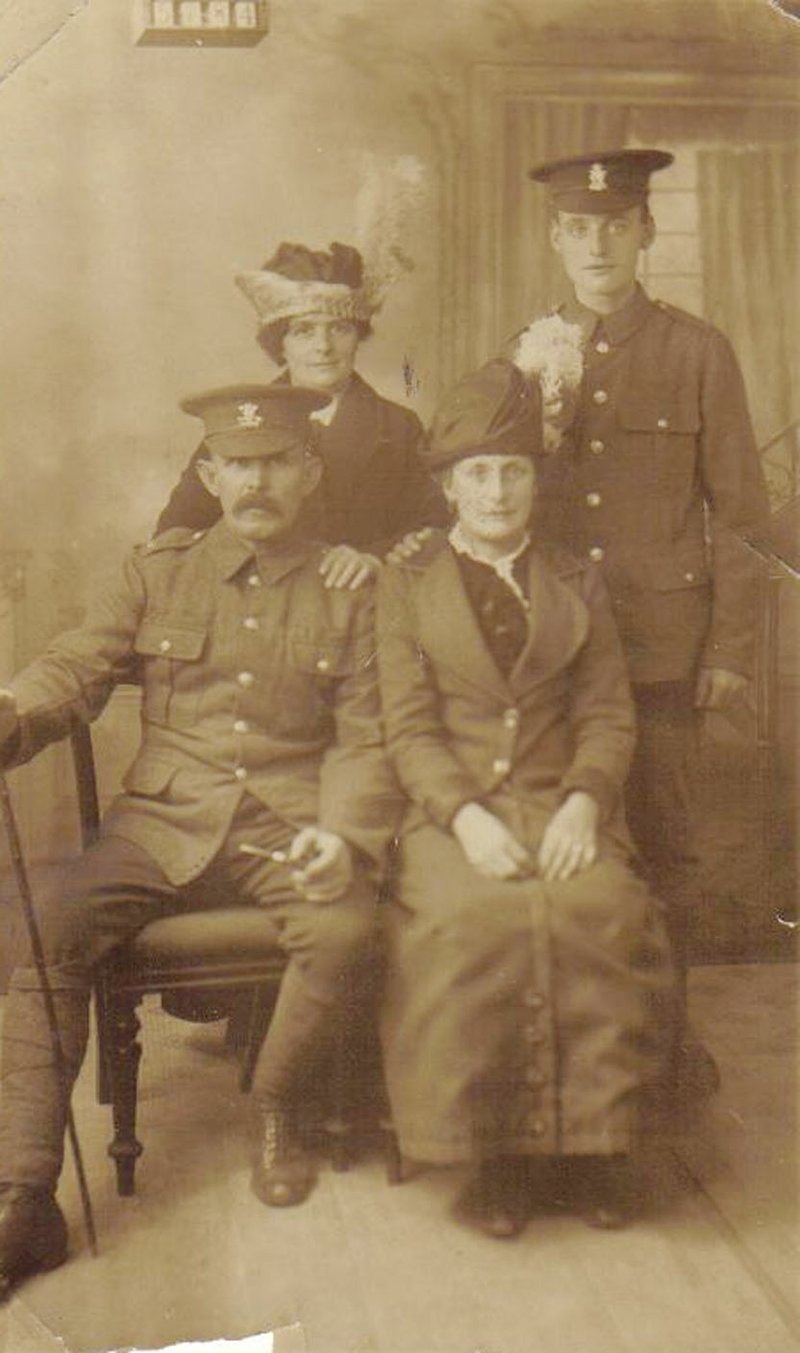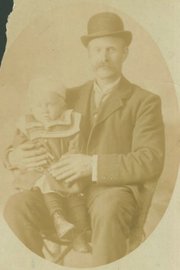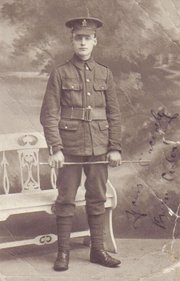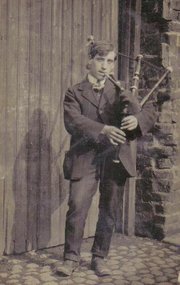Many of the earliest settlers in Northwest Arkansas had Scots-Irish roots. They came from Kentucky, Tennessee, Virginia, West Virginia -- and even some Quakers from Pennsylvania -- to settle in the area, said Rachel Whitaker, research assistant at the Shiloh Museum for Ozark History in Springdale.
The early settlers came to Northwest Arkansas because "it was a familiar environment," she said. "They knew how to raise crops, what kind of animals they could keep. It was the same environment they had in Ireland and Scotland."
On the web
Irish geneaology websites
Ulster Historical Foundation
Irish Family History Foundation
rootsireland.ie
Government birth, death, marriage records
irishgenelaogy.ie
Public Record Office of Northern Ireland
nidirect.gov.uk/proni
Trace your roots
Who: Ulster Historical Foundation
What: Workshop on Irish geneaology
When: 9 a.m. to 4 p.m. Saturday
Where: Bentonville Community Center, 1101 S.W. Citizen’s Circle
Sponsor: Northwest Arkansas Geneaological Society
Information: 271-6820, genealogy@bentonvil…, rootsweb.ancestry.c…
Alternate date
When: 6 to 9 p.m. March 21,
Where: Hillcrest Hall, 1501 Kavanaugh Blvd., Little Rock.
Sponsors: Arkansas Genealogical Society, Butler Center for Arkansas Studies.
Information: (501) 320-5711, [email protected], butlercenter.org
These settlers left Ireland and Scotland for a variety of reasons -- famine, religious and political persecution, Whitaker said. "And they saw new opportunity in (the United States) when things weren't going so great."
Many of the settlers came to Arkansas after 1850, said Nancy Feroe, president of the Northwest Arkansas Genealogical Society. "The land had been surveyed by then.
"There was not opportunity in the East to have a farm, so they came and set up their own for their family," she continued.
Many of the settlers came to Northwest Arkansas because they had friends or family who had migrated here. "Sometimes, they came in groups. An entire community might pick up and move," Whitaker said.
During this time, the federal government was giving land grants for military service in the War of 1812.
"It was really a great opportunity," Whitaker said. "It was really cheap land. They were looking for opportunity and freedom, and worth came from owning property and making it on your own."
People trace their roots for a number of reasons. "Some just need to know," Feroe said.
Whitaker, who also knows her family history, agreed. "You just really need to know where you come from, who you are. "
She pointed out the family history might reveal death patterns and health problems related to genetics. Also, it can mend fences, she said. "You can finally know the truth about why Dad and Grandpa haven't talked for years."
"It's a mixed bag what you get (when you research family history)," said Whitaker. One person found his ancestor was locked up in prison, while another was able to track down two older siblings and get to know her father through them.
Many in the community turn to Whitaker they have hit what genealogists call "a brick wall" -- which often happens as soon as the ancestors set foot on American soil. "So many ships did not keep complete manifests. Maybe the ship's records were more complete in Ireland."
And there's a belief that many records burned in a 1922 fire in a courts building in Dublin, said Fintan Mullan, a genealogist with the Ulster Historical Foundation in Belfast, Ireland. He pointed out there are many other collections of records people can turn to when searching their Irish ancestry.
Mullan and Gillian Hunt of the Ulster Foundation will share those collections and more Saturday during a workshop in Bentonville sponsored by the Northwest Arkansas Genealogical Society.
Mullan answered some questions about his work and family via email.
Explain the purpose and work of the Ulster Historical Foundation.
The Ulster Historical Foundation was established in 1956 and opened for business in 1957 (we are 60 years old) as a research arm of the state archive, the Public Record Office of Northern Ireland. Quite unique within the United Kingdom and Ireland, the foundation was created to provide a bridge for the diaspora to reconnect to Ireland -- and specifically Ulster, the historic nine-county northern province -- through family history. The foundation exists to help people to discover their Irish and Scots-Irish roots, and we provide services which facilitate research and disseminate information about historical sources and how to access them. For more than 60 years, the foundation has helped tens of thousands of people to trace their Ulster roots and have brought many of them to Ireland through organized tours and genealogy conferences to help them to trace their roots for themselves. Crucially, the foundation is also one of the only organizations in the United Kingdom and Ireland to regularly travel to the United States and Canada to speak to groups about Irish research and how to discover their Irish roots. We reach out to America at least once a year through our tours -- hence our current lecture itinerary, which includes Bentonville.
The Foundation is an educational nonprofit and is a completely self-sustaining organization. We provide historical and genealogical research for clients, publish books and guides, host conferences, tours and genealogy courses. We have a membership society with a worldwide audience, to which people can belong, and we transcribe and digitize historical resources relevant to Irish family history and make them available to the family history sector.
Are you a genealogist? How did you get started? What's the most interesting thing you've found about your family in your search?
The organization is made up of a mix of staff who are genealogists, historians and support staff who work with the research to deliver our services. Our genealogists are drawn from a wide range of backgrounds -- although often they have come from a history background at undergraduate and post-graduate levels. That said, we have found scientists -- in fact, chemists -- have made very good researchers. The ability to bring an analytic approach and research skills is highly suited to the discipline of genealogical research. Only recently have courses been offered by universities in genealogy related studies in Ireland.
Fintan Mullan came to genealogy through the digitization of historical records, with which he was first involved when he joined the foundation. Gillian Hunt joined the research team after post-graduate studies. Mullan has been able to identify all the places where his great-grandfather lived in County Down and has been able to walk the land of this forebear -- something he talks about during the presentations. He has discovered that his maternal family have lived in the same area for more than 200 years and were possibly residing there back as far as 350 years ago.
What's the most exciting thing to help someone else find? How does it make you feel when others achieve success?
We can get quite emotionally involved in our clients' search for their ancestors, and we get very excited when we make a breakthrough for them -- especially if it something they have been looking for years and thought they would never find, or if it is a "needle in the haystack" type of search where the client has very little information to go on. It is fantastic to be able to provide the client with details of their ancestors' lives in Ireland and give them the exact location where they lived. In many cases, if they are able, they then organize a trip to Ireland to visit the farm or even the actual house where their ancestor lived -- that provides us with a great deal of satisfaction.
Two good examples of the sense of achievement we feel in being able to help clients make a connection would include one lady whose family hailed from County Armagh. Through careful use of landed estate leases, Griffith's Valuation and a fragment of an early census return, we were able to identify the actual family farm holding which the client was able to visit in person with her family. (The farmhouse was being used as a cow shed.)
The second was during one of our annual genealogy events back in 1998. We brought a group on a tour of the southern counties. In Waterford City, we visited the local Irish Family History Foundation Centrem, and the priest, Father O'Connor, who ran the center demonstrated to the group his database of baptisms and births, marriages, deaths (BMDs) for his area. He asked if anyone had a name they wanted to search. Two sisters from New York City called out a name, and the first record that turned up on the search results was their direct ancestor. As the pair of them wept like children -- as they had come to Ireland to try to find this ancestor -- the rest of the group cheered and applauded. Everyone felt a sense of accomplishment. It was something the whole group felt part of, as it resonated with them as they, too, were in Ireland to discover their ancestors.
Why is it hard to research Irish families? And I understand that the records all reach back to England?
It can be difficult to trace Irish families for two reasons. First, there was the loss of records in the fire at the Four Courts building in Dublin in 1922, which is well known to many people pursuing Irish ancestry. This has tended to create the impression that Irish ancestry is difficult because all the records were destroyed. That of course is wrong -- while the devastation was massive, there are vast collections stretching back to the 18th and even 17th centuries that people can use to identify their forebears. It might not be as straightforward as research in other countries, but it does have the benefit of drawing the family historian in to the fascinating wider history of Ireland, as they explore the archives using unusual sources and documents which were never intended to be used for family history.
The second reason is, that due to the course of Irish history, certain records were not recorded in the first place, leaving gaps in the historical record. For example, the Catholic and Presbyterian churches were disadvantaged by the penal laws passed in the early 18th century which discouraged the keeping of records by both these denominations. However, luckily, some early records for both churches do survive, and as we demonstrate in our presentations, there are alternative sources that can be used to document families. Despite the difficulties created by the loss of records, Irish family history can be intriguing and also great fun.
Although England did govern Ireland for much of its history -- and there are some records that cover both Britain and Ireland that are held in the National Archives in Kew, London -- the records relating to Ireland, by and large, are held in Ireland, in both Belfast and Dublin (because of the two separate modern jurisdictions) and also in other local archives and regional centers across the island.
What are some of the common "brick walls"? How do you break or go around them?
Some of the common brick walls are the lack of information that is known about ancestors in Ireland,or a lack of location where the family originated. Commonly, people try to use shipping lists to find embarkation point or town of origin -- without success as this information is not always recorded. Also, frustratingly, some family historians find the direct ancestors (eg. great-great-grandfather) is the most difficult to find. They sometimes can identify a sibling (ie. great-uncle) but not the direct ancestor. However, there are ways around some of issues -- which we deal with in our presentations -- using examples of cases drawn from our own research showing how we can overcome such brick walls.
One of the most important steps forward in overcoming brick walls is the massive and hugely important database of BMDs from rootsireland.ie. Containing more than 20 million records for some 30 of the 32 counties of Ireland, this database can help resolve brick walls, given the coverage and interconnectedness of the data.
Why is it important for people to trace their family history? Some people really care, others don't care at all. Why?
As people get older -- or more often than not, following the death of a close family member -- individuals can develop a strong interest in their ancestry. Family history is such a fun pursuit and so engaging -- one can spend decades working on it, and there is always something new or additional to discover. It is an ideal pastime to keep the mind and body active, and it can be a very social and enjoyable activity. It is also very educational, as one not only learns about the family, but the country the immigrant ancestor hailed from -- be it Ireland, Scotland, Germany or Italy.
People can get engrossed because whether there are rogues or saints, or there are many skeletons in the closet, it is their family being researched, so it is naturally of great interest to them. And through old family photographs, letters, etc., they can identify common family traits, likenesses with living relatives, etc. Also as a pastime, and if they have the financial means, genealogy can facilitate travel to many interesting places. For example, in rural Ireland it can allow the genealogist to feel part of a community, even for a short time. And there is always the possibility when visiting Ireland of meeting a living relative.
Others can be satisfied with a quick glance at an old census return or marriage record. They don't feel the need to go further. But the great thing about family history is people can go as far as their interest lasts, leave it for years and return to it with fresh energy and enthusiasm. And irrespective of skills, knowledge or experience, they can participate in the activity to the level they feel comfortable.
What is some specific information you will share with folks in Northwest Arkansas? Can you give me a specific piece of information that I might share with my readers who might not be able to attend the meeting?
We will be delivering a full day program in Bentonville which will be suitable for the novice and experienced genealogist alike as we will cover quite a lot of ground in our presentations, which include:
• An introduction to various archives in Ireland and its websites.
• Understanding Irish town lands: the importance of place, identity and administrative divisions in Irish research.
• Church records for use in genealogical research: baptismal, marriage and burial records.
• Using land records: Griffith's Valuation, tithe and estate records.
• Emigration from the north of Ireland to North America -- strategies for researching immigrant ancestors.
• Solving Your Brick Walls -- using online databases to help individuals find their ancestors.
• General question and answer session.
A specific piece of information for your readers would be, despite the impression that Irish research is difficult, it is getting easier all the time as more and more material is placed online. For example, the Irish government has put online historic birth, death and marriage records on irishgenelaogy.ie and the Public Record Office of Northern Ireland have recently released a superb historic map resource available on their website, nidirect.gov.uk/proni.
NAN Our Town on 03/09/2017




